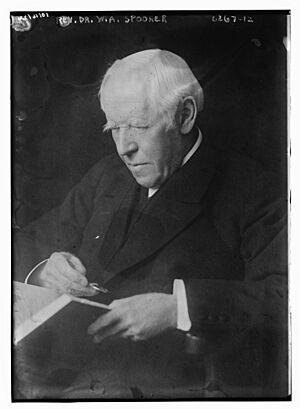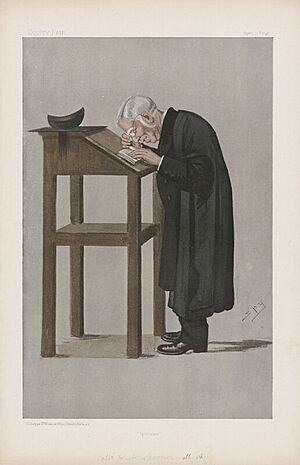William Archibald Spooner facts for kids
William Archibald Spooner (born July 22, 1844 – died August 29, 1930) was a British clergyman and a long-time teacher and leader at Oxford University. He was famous for being a bit absent-minded, and for accidentally mixing up the sounds in words when he spoke. These funny mix-ups became known as spoonerisms. Many of these phrases were made up and said to be his, but they are still used today to make people laugh.
Quick facts for kids
William Archibald Spooner
|
|
|---|---|

Spooner in 1924
|
|
| Born | 22 July 1844 Grosvenor Place, London
|
| Died | 29 August 1930 (aged 86) |
| Nationality | English |
| Known for | Spoonerisms |
| Spouse(s) | Frances Wycliffe Goodwin (1878) |
Contents
About William Spooner
William Archibald Spooner was born in London, England, on July 22, 1844. He was the oldest son of William and Jane Spooner. He went to Oswestry School and later to New College, Oxford, which is a famous university.
He became a priest in the Church of England in 1875. In 1878, he married Frances Wycliffe Goodwin. They had five children together.
His Time at Oxford
Spooner stayed at New College for over sixty years. He held many important jobs there. He was a fellow, which is like a senior member of the college. He also worked as a lecturer, tutor, and dean. From 1903 to 1924, he was the warden, which is the head of the college. He taught subjects like history and philosophy.
People liked and respected Spooner very much. He was described as a kind and friendly person. He had albinism, which meant he had very pale skin and hair, and poor eyesight. Even with his unique appearance, he was known for being a wise and dedicated leader.
William Spooner passed away on August 29, 1930. He was buried in a cemetery in Grasmere, England.
What are Spoonerisms?
Spooner became famous for a funny way he sometimes spoke. This was called a "spoonerism". A spoonerism happens when you accidentally switch the first sounds or letters of two words in a phrase. This often makes the phrase sound silly or funny.
Most of Spooner's own spoonerisms were accidents. Many of the famous ones you hear were actually made up later and just said to be his. It's even said that he didn't like being known for mixing up his words!
Famous Examples
Only a few of Spooner's actual spoonerisms have been proven. One real example he said was:
- "The weight of rages will press hard upon the employer."
- This was supposed to be: "The rate of wages will press hard upon the employer."
In 1928, Spooner himself said he once called out a hymn as:
- "Kinkering Congs Their Titles Take"
- He meant to say: "Conquering Kings Their Titles Take."
Many other funny sayings were made up and linked to him, like:
- "It is kisstomary to cuss the bride." (Instead of: "It is customary to kiss the bride.")
- "I am tired of addressing beery wenches." (Instead of: "I am tired of addressing weary benches." This was said after a long speech.)
- "Mardon me padam, this pie is occupewed. Can I sew you to another sheet?" (Instead of: "Pardon me, madam, this pew is occupied. Can I show you to another seat?")
- "You have hissed all my mystery lectures, and were caught fighting a liar in the quad." (Instead of: "You have missed all my history lectures, and were caught lighting a fire in the quad.")
- He once told a student who wasted two terms: "You have tasted two worms." (Instead of: "You have wasted two terms." )
- "You will leave by the next town drain." (Instead of: "You will leave by the next down train." )
Spooner was also known for other absent-minded moments. Once, he invited a teacher to tea, saying he wanted to welcome "Stanley Casson, our new archaeology Fellow." The teacher replied, "But, sir, I am Stanley Casson!" Spooner just said, "Never mind, come all the same."
Works
Spooner also wrote some books during his life:
- The Moral Philosophy Of Aristotle (1879)
- Bishop Butler (1901)
See also
- Absent-minded professor
- Spoonerism


